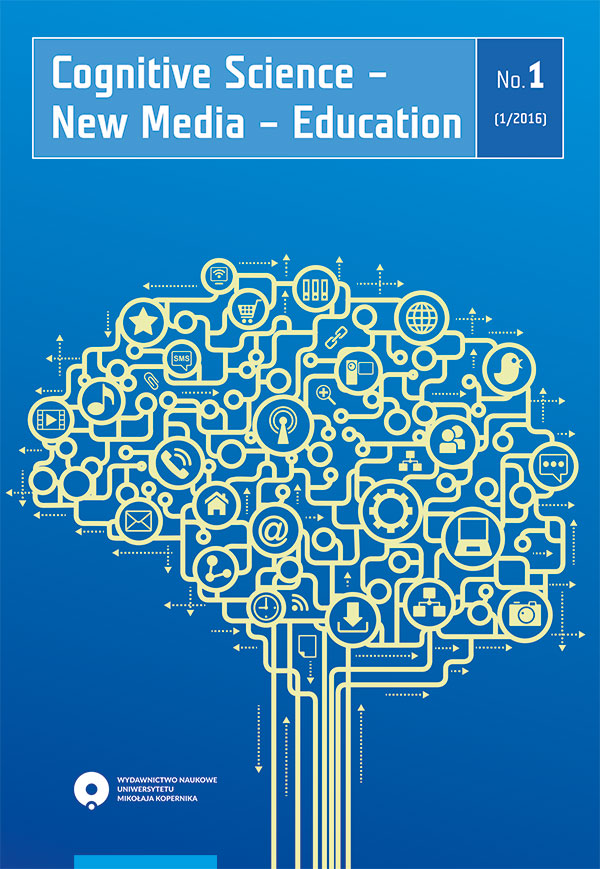The dictatorship of democracy or democratic dictatorship in the new media
DOI:
https://doi.org/10.12775/CSNME.2016.001Słowa kluczowe
decentralization, network, media, ideology, culture, media literacyAbstrakt
Decentralization of media has its assumption of fulfillment on the Internet, the network of all networks. At the same time, eo ipso, a logical sequence is the democratization of society as a whole, if it is used as a general social tool, and not as a manipulative form of appearance. Culture of ideology or Ideology of the culture pervades through social networks as a double-edged sword of the game that involves the society aiming towards satisfaction of ideology, although not the culture within its own incidence. The absurdity that social network have corrupted the quality of a healthy society is in conflict with the assumptions of everyday life, because as it is no longer the basic question how technology changed our world, but which social need have been met through the use of modern technologies. Through three levels of understanding of the ideology of the media in this paper I will present that every ideology is imaginary distortion of the real conditions within the appearances of each of us. Exclusively and only because of its own, the current goals of manipulation, without the existence of strategic plans for the shaping of society as a whole but only for the group that supports a given ideology, through the ideological order, with the help of the Network, creates cultural awareness and not vice versa. The answer is in media literacy, first - educators, and then all the other layers of society, regardless of ideology, race, ethnicity and / or gender. And through the Network, above all.
Bibliografia
Adorno Theodor, Horkheimer Max (1989), Dialectic of Enlightenment: philosophical fragments, Sarajevo: VeselinMasleša, Bosnia and Herzegovina.
Althusser Louis (1971), Ideology and Ideological State Apparatuses (Notes towards an Investigation), u studiji Lenin andPhylosophy. And Other Essays, Monthly Review Press, New York i London, USA & UK.
Brecht Bertol (1993 [1932]), The Radio as an Apparatus of Communication [in:] Radiotext(e), ed. Strauss N.,Mandl, D., New York: Semiotext(e).
Hadžialić Sabahudin (2016), South-East Europe at the Edge of Civilization, USA: Eurasia Review, (pg. 53-107).
Hall Stuart (2006), Notes on Deconstructing 'The Popular' [in:] People’s History and Socialist Theory, ed. Samuel R., London: Routledge & Kegan Paul.
Hoggarth Richard (1957), The Uses of Literacy, London: Pinguin Books, United Kingdom.
Levinson Paul (1999), Digital McLuhan: A Guide to the Information Millennium, London: Routledge, United Kingdom.
Lévy Pierre (2001), Cyberculture, Minneapolis – London: University of Minnesota - original (1997) Cyberculture. Rapport au Conseil del’Europedans le cadre du projet “Nouvellestechnologie: coopérationculturelleet communication”, Paris: Odile Jacob.
McLuhan Marshall (1964), Understanding media – The extension of man, New York: McGraw Hill, reissued by MIT Press, 1994, with introduction by Lewis H. Lapham, USA.
Thacker Eugene (2006), Foreword: Protocol is as Protocol Does [in:] Protocol: How Control Exists after Decentralization, ed. Galloway Alexander R., Cambridge: The MIT Press.
Vlajki Emil (1984), The games of social communication, Belgrade: NIRO „Mladost“, Yugoslavia.
Williams Raymond (1974), Television. Technology and cultural form, Hanover, N.H.: Wesleyan University Press.
APC: Anton Pavlovich Chekhov Biography in: Biography.com, http://www.biography.com/people/anton-chekhov-9245947.
Daniels Kit (2015), Why Obama wants to control the Internet? [in:] Infowars.com - February 12, 2015, http://www.infowars.com/why-obama-wants-to-regulate-the-internet/.
DIOGEN pro culture, magazine for art, culture, education and science (USA & BiH): http://www.diogenpro.com (Slogan:“WE ARE UNIFYING DIVERSITIES“).
Hadžialić, Sabahudin (2013), Demagogy of the media – information or manipulation (involvement of social networks on WWW), Travnik: International University Travnik, Bosnia and Herzegovina: http://www.iu-travnik.com/v2/images/ZavrsniMagistarskiRadovi/Magistarski%20rad_Sabahudin_Hadiali.pdf.
Pobrania
Opublikowane
Jak cytować
Numer
Dział
Statystyki
Liczba wyświetleń i pobrań: 647
Liczba cytowań: 0



